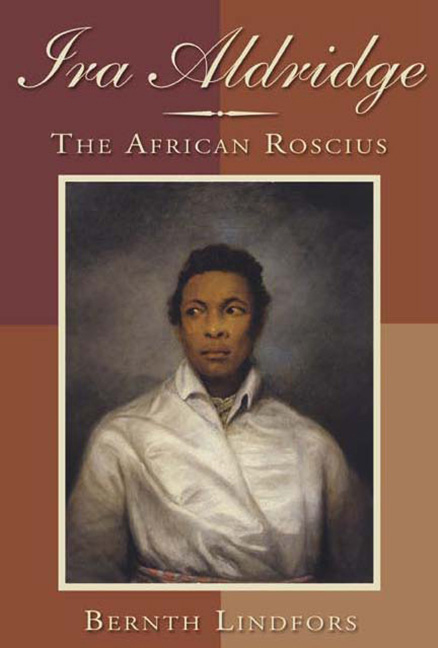Book contents
- Frontmatter
- Miscellaneous Frontmatter
- Contents
- List of Illustrations
- Acknowledgments
- Introduction
- Part One: The Life
- 1 Memoir and Theatrical Career of Ira Aldridge, the African Roscius
- 2 Ira Aldridge (1860)
- 3 Men We Have Known: Ira Aldridge (1867)
- 4 “Nothing extenuate, nor set down aught in malice”: 50 New Biographical Information on Ira Aldridge
- 5 Ira Aldridge's Swedish Wife
- 6 “African Tragedian” in Golden Prague: Some Unpublished Correspondence
- 7 A Garland of Love Letters
- Part Two: The Career
- Notes on Contributors
- Index
- Miscellaneous Endmatter
7 - A Garland of Love Letters
from Part One: The Life
Published online by Cambridge University Press: 26 October 2017
- Frontmatter
- Miscellaneous Frontmatter
- Contents
- List of Illustrations
- Acknowledgments
- Introduction
- Part One: The Life
- 1 Memoir and Theatrical Career of Ira Aldridge, the African Roscius
- 2 Ira Aldridge (1860)
- 3 Men We Have Known: Ira Aldridge (1867)
- 4 “Nothing extenuate, nor set down aught in malice”: 50 New Biographical Information on Ira Aldridge
- 5 Ira Aldridge's Swedish Wife
- 6 “African Tragedian” in Golden Prague: Some Unpublished Correspondence
- 7 A Garland of Love Letters
- Part Two: The Career
- Notes on Contributors
- Index
- Miscellaneous Endmatter
Summary
There were, of course, the inevitable crowd of admiring ladies. What actor of great repute escapes them? They ranged as usual from the very young—like the sender of the photograph “To a great artist from a little actress”—to the very elderly, from nursery-governesses to Grand Duchesses. And that was the atmosphere in which he [Aldridge] lived. To those who look at love letters in the spirit of a Peeping Tom, with a foolish snigger or perhaps still worse with a slight disgust, there will be little that is delightful in old love letters. They will seem foolish and old-fashioned, their charms will seem to have long since faded. Yet in love letters that are simple and sincere there is always something fresh and arresting, in spite of, or perhaps because of, their being remarkably the same in all ages; each seems so essentially personal and yet savoring of something so eternal; perhaps that is their fascination.
Of the flood of letters that Ira Aldridge received from his many admirers we must pick out a little garland. There is Matilda of Pest who will take a post with a family or even marry anyone in order to live near him. There is the very domestic Sophia Zybum who insists in incorporating her whole family in a united adoration. There is Elise of Odessa of the flowered notepaper with the pansies and forgetme-nots; there is another friend in Pest, this time heavily coroneted who would like some little poesies to translate into Hungarian; and Alexandra Menenskiansky, also with a large crest, who has an eye on her brother's purse as well as her own gratification. Another member of the aristocracy writes in French of a wonderful dream in which they are eating cheese together, but most of the foreigners [Continental Europeans] are struggling with the English language. Yet that is a small matter compared with the almost hopeless struggle to express their feelings adequately even in their native tongue. After a letter beginning “As little as badly I English can,” the rather stilted affectionate writing of Eliza Buckland or of the lady, Keajensky, sounds almost flowing.
- Type
- Chapter
- Information
- Ira AldridgeThe African Roscius, pp. 79 - 94Publisher: Boydell & BrewerPrint publication year: 2007

